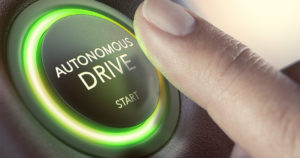Self-Driving Vehicles Now Approved For Deliveries
February 27, 2020 Federal legislators recently decided that robotic delivery company Nuro will be allowed to move forward with its goal of creating a nationwide fleet of purpose-built self-driving vehicles. The cars will deliver food and groceries on behalf of companies like Walmart, Krogers, and Domino’s Pizza – but unlike regular cars, Nuro’s will be completely driverless. The recent ruling shows that the Department of Transportation (DOT) may not hold robotic vehicles to the same industry standards as conventional automobiles, which raises numerous questions about the future – and safety – of American roadways.
Federal legislators recently decided that robotic delivery company Nuro will be allowed to move forward with its goal of creating a nationwide fleet of purpose-built self-driving vehicles. The cars will deliver food and groceries on behalf of companies like Walmart, Krogers, and Domino’s Pizza – but unlike regular cars, Nuro’s will be completely driverless. The recent ruling shows that the Department of Transportation (DOT) may not hold robotic vehicles to the same industry standards as conventional automobiles, which raises numerous questions about the future – and safety – of American roadways.
Nuro is a young American robotics firm based out of California. Founded only four years ago, the company has already managed to make quite an impact in both the automotive and robotics industries and is estimated to be worth a whopping $2.7 billion. Nuro is also the first company to be awarded federal approval for its purpose-built self-driving vehicles, which are created specifically to drive themselves (as opposed to self-driving vehicles, which offer driverless features but are also fitted for driver input).
The Rules of Nuro’s Agreement
According to the federal agreement, Nuro’s fleet of robotic vehicles will have to follow certain strict guidelines. For example, the company cannot manufacture more than 5,000 purpose-built vehicles, and the cars will not be allowed to travel above 25 mph. The agreement will only be in effect for two years, and none of Nuro’s vehicles will be permitted to transport passengers. However, the agreement is still complex and in some ways, potentially problematic. Because robotic vehicles were not a part of the automotive industry until fairly recently, lawmakers are struggling to catch up with the ever-changing landscape without compromising American safety.
It is unclear exactly which agency – and to what degree – is responsible for overseeing safety concerns related to purpose-built self-driving vehicles. The National Highway Traffic Safety Administration, or NHTSA, estimates that by the year 2025 most vehicles will be equipped with fully automated, or 100% driverless safety features. Yet despite being tasked with preventing injuries and deaths resulting from automobile accidents, the NHTSA says it is not responsible for investigating how safe and competent Nuro’s robotic drivers are. Instead, in 2018 the administration came up with a “vision for safety,” which essentially leaves most of the decision making and oversight of robotic vehicles up to state instead of federal government.
The Tragic Truth About Car Accidents
Car accidents are one of the leading causes of death in the United States. More than 36,500 people died in car crashes in 2018 alone. While self-driving vehicles promise to create safer roadways, autonomous cars have also been involved in fatal accidents since they were first introduced. For example, an autonomously operated Uber vehicle fatally struck a female pedestrian in Arizona in 2018, and there have been at least four recorded driver fatalities involving vehicles set on autopilot mode. It is critical that legislators and transportation safety advocates ensure purpose-built self-driving vehicles are held to high standards in order to prevent these tragedies from continuing to happen, especially since we can expect to see an influx of these vehicles in coming years.
Nuro’s founders say they have manufactured their vehicles to “drive courteously” and to be “socially responsible,” but only time will tell if they are safely designed and operational. We will continue to keep our readers updated as this story develops, but if you have questions or concerns about injuries you sustained in an automobile accident, someone at our firm can help. Please contact a representative directly.
Philadelphia Personal Injury Lawyers at Galfand Berger, LLP Represent Automobile Accident Victims
Galfand Berger has offices located in Philadelphia, Bethlehem, Reading and Lancaster, our attorneys serve clients throughout Pennsylvania and New Jersey. To schedule a consultation, call us at 800-222-8792 or complete our online contact form.
 Google Screened
Google Screened
